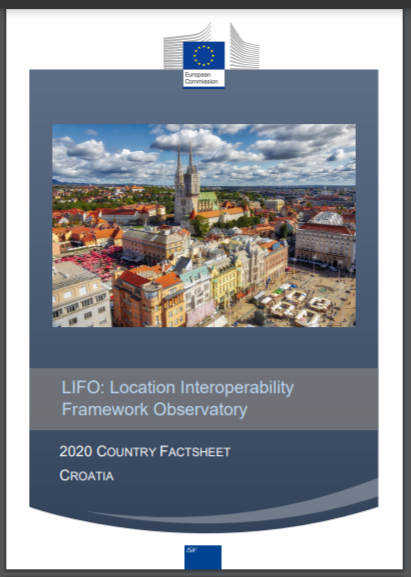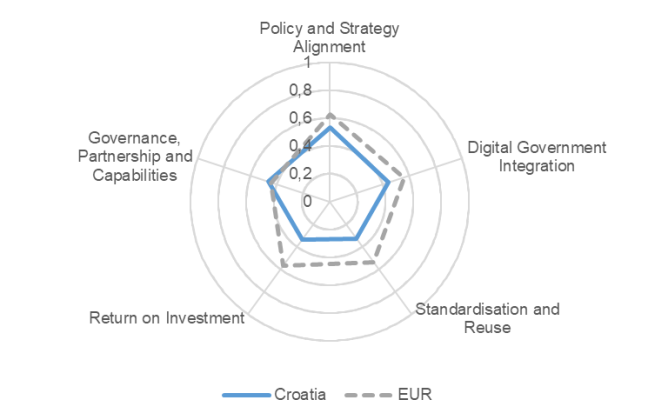



The Location Interoperability Framework Observatory (LIFO) monitors the implementation of location interoperability good practices in European public administrations, based on the level of adoption of recommendations in the EULF Blueprint.
The overview of 2020 location interoperability status in Croatia is based on the information provided by Državna Geodetska Uprava (State Geodetic Administration – SGA).
The information collected through the LIFO 2020 data collection indicates that Croatia scores below the European average across almost all focus areas assessed.
In “Policy and Strategy Alignment”, the country relies on the obligation to use authoritative geospatial datasets mandated by general cross-sector legislation, on the alignment of the NSDI strategy and the digital strategy under several aspects and on the reference to INSPIRE and other relevant geospatial standards in the procurement of location data and services. There are margins for improvement with respect to the availability of location core reference datasets under a broad core reference data policy and in the preparedness of public bodies for the GDPR under a location data perspective.
The country’s positioning in “Governance, Partnership and Capabilities” is the result of the actions taken under the three aspects of SDI governance, establishment of partnerships between national public bodies and with foreign agencies and the good approach to capacity and awareness building on location information in digital public services. These efforts all go in the right direction while still being at an initial stage of maturity.
In “Return on Investment”, the country shows a strong alignment with the EULF Blueprint recommendation concerning the communication of the benefits of integrating and using location information in digital public services. The gaps in the performance monitoring of location-enabled services and in the promotion of the uptake of public location data by the private sector bring down the overall result in this focus area.
With respect to “Digital Government and Integration”, some steps have been taken to modernise and simplify digital public services through the use of location information and location intelligence. The application of collaborative practices particularly with stakeholders outside of the public sector is still quite limited.
Finally, “Standardisation and Reuse” is noticeably below the European average. Croatia has a wide margin for improvement under different dimensions: the maturity of the integration of location-enabled services in a common architecture, the limited reuse of generic ICT solutions in the SDI, the number of authentic location data registers, the low compliance of location datasets and network services with the applicable INSPIRE implementing regulations. A positive note is a relatively consistent adoption of standards to develop a comprehensive data modelling approach.
The value of the overall LIFO index combining the scores for all focus areas is 0.44, which shows room for improvement in terms of location interoperability. This compares with a European average of 0.55.

For more details, download the factsheet in the attachment section below.
Click here to find out more about the Location Interoperability Framework Observatory (LIFO)
Click here to explore the LIFO 2020 and 2019 results in the LIFO Interactive Dashboards